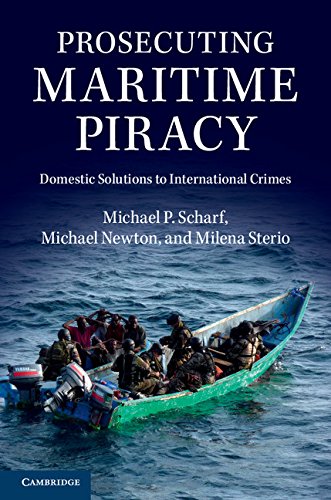 Michael A. Newton, professor of the practice of law, is one of three co-editors of a new book of essays, Prosecuting Maritime Piracy: Domestic Solutions to International Crimes, released by Cambridge University Press in June 2015. The book also includes Newton’s essay, “Piracy and the Problem of Command Responsibility,” in a section addressing legal issues in domestic piracy trials.
Michael A. Newton, professor of the practice of law, is one of three co-editors of a new book of essays, Prosecuting Maritime Piracy: Domestic Solutions to International Crimes, released by Cambridge University Press in June 2015. The book also includes Newton’s essay, “Piracy and the Problem of Command Responsibility,” in a section addressing legal issues in domestic piracy trials.
Newton co-edited the book, which addresses various aspects of prosecuting piracy in national courts, with Michael P. Scharf of Case Western Reserve University and Milena Sterio of Cleveland State University. Its 13 chapters address the definition of the crime of piracy; jurisdiction over piracy offenses; the pursuit, arrest and pre-trial treatment of suspected pirates; legal issues in domestic trials of individuals accused of piracy; and the sentencing and post-sentencing treatment of convicted pirates.
Newton is an expert in international criminal law whose scholarship encompasses war crimes and crimes against humanity as well as piracy and other transnational crimes. His chapter of the book examines the difficulties in adapting the military doctrine of command responsibility, through which military commanders can be held responsible for the actions of their subordinates—a doctrine moored in the laws and customs of warfare—for use in piracy prosecutions.
 “No nation on earth currently incorporates an analogue to the ‘command responsibility’ regime into its domestic criminal law for use in prosecuting pirates,” Newton said. “But since piracy poses a persistent threat and current law enforcement mechanisms don’t adequately address the problem, adapting domestic and international liability laws to allow governments to hold the leaders of pirate gangs legally accountable for acts of piracy committed by those under command is entirely appropriate.”
“No nation on earth currently incorporates an analogue to the ‘command responsibility’ regime into its domestic criminal law for use in prosecuting pirates,” Newton said. “But since piracy poses a persistent threat and current law enforcement mechanisms don’t adequately address the problem, adapting domestic and international liability laws to allow governments to hold the leaders of pirate gangs legally accountable for acts of piracy committed by those under command is entirely appropriate.”
Newton also points out that prosecuting gang leaders is the only effective way to reduce the incidence of piracy. “For every low-level perpetrator prosecuted, dozens more are ready and willing to take their place because of the financial incentives, the social consciousness of the perpetrators, and simple human greed,” he said. “Extending the doctrine of command responsibility into the context of piracy could provide an effective tool that targets the real authority figures who control pirate operations.”
Newton proposes using the same strategy employed in successful investigative journalism and criminal investigations—“follow the money”— to identify leaders of pirate gangs. “In the fight against piracy, you want to catch the big fish rather than the minnows, and you can do that only by identifying the authority figures responsible for organizing pirate gangs and orchestrating acts of piracy,” he said.
Newton, whose research focuses on accountability and conduct-of-hostilities issues, also contributed an essay, “Charging War Crimes: Policy & Prognosis,” to The Law and Practice of the International Criminal Court, a textbook edited by Carsten Stahn and released by Oxford University Press in 2015. Over the course of his career, he has published more than 80 articles and book chapters, as well as opinion pieces for the New York Times, the International Herald Tribune and other newspapers. In addition to numerous articles on issues of international law, he is the author of Enemy of the State: The Trial and Execution of Saddam Hussein (St. Martin’s Press, 2009) and was the senior editor of Terrorism: International Case Law Reporter (2007–12, updated annually). His book Proportionality in International Law, co-authored with Vanderbilt philosophy professor Larry May, was published by Oxford University Press in 2014.